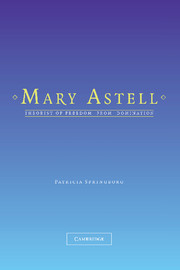Book contents
- Frontmatter
- Contents
- Acknowledgements
- Mary Astell, a Brief Chronology
- Introduction: Astell and Early Modern Feminism
- 1 Mary Astell, Philosopher, Theologian and Polemicist
- 2 Astell, Drake, Education, Epistemology and the Serious Proposal
- 3 Astell on Marriage, Patriarchalism and Contractarianism
- 4 Mary Astell and the Settlement of 1689
- 5 A Fair Way with the Dissenters and Their Patrons
- 6 Astell, Locke and the Highway Man: A Test Case
- 7 Astell, Drake and the Historical Legacy of Freedom
- Appendix: Glossary and Select Biographical Notes
- Notes
- Select Bibliography
- Index
5 - A Fair Way with the Dissenters and Their Patrons
Published online by Cambridge University Press: 07 September 2009
- Frontmatter
- Contents
- Acknowledgements
- Mary Astell, a Brief Chronology
- Introduction: Astell and Early Modern Feminism
- 1 Mary Astell, Philosopher, Theologian and Polemicist
- 2 Astell, Drake, Education, Epistemology and the Serious Proposal
- 3 Astell on Marriage, Patriarchalism and Contractarianism
- 4 Mary Astell and the Settlement of 1689
- 5 A Fair Way with the Dissenters and Their Patrons
- 6 Astell, Locke and the Highway Man: A Test Case
- 7 Astell, Drake and the Historical Legacy of Freedom
- Appendix: Glossary and Select Biographical Notes
- Notes
- Select Bibliography
- Index
Summary
Locke, Toleration and Dissent
A Fair Way with the Dissenters and Their Patrons of 1704 was Astell's answer to Daniel Defoe's anonymous More Short-Ways with the Dissenters of the same year. Like An Impartial Enquiry it is a pamphlet difficult to read out of context, and indeed, this context is important to review, if for no other reason than to demonstrate how inextricably Astell's contribution is bound up with those of Tory High Churchmen known as the ‘High Flyers’, *Charles Leslie and *Henry Sacheverell, and yet how anxious Astell is to distance herself from them and receive acknowledgement for her own work. As we shall see, she had to protest in print against the crediting of her pamphlets to these more visible men. Defoe had fired the opening shots in the pamphlet warfare over occasional conformity with a series of pamphlets, among them The Shortest Way with the Dissenters (1702), in which he had parodied Leslie and Sacheverell precisely. Their responses, of Leslie in particular, suggested that he had not been wide of the mark, as he pointed out in More Short-Ways with the Dissenters (1704), to which Astell herself responded with A Fair Way with the Dissenters (1704). While serving a jail sentence for libeling the church, Defoe in 1704 started the Review, a regular periodical devoted to politics, which attracted vigorous debate from Charles Leslie in the Rehearsal and provided the forum for a critique of John Locke, in many respects Defoe's mentor.
- Type
- Chapter
- Information
- Mary AstellTheorist of Freedom from Domination, pp. 164 - 186Publisher: Cambridge University PressPrint publication year: 2005



